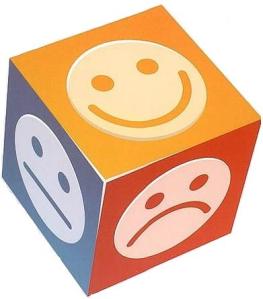
Are you an emotional decision maker?
All of us make decisions – everyday, whether at home, work or simply just socializing. There surely can be no doubt that this is a key skill to master.
Neuro-Linguistic Programming or NLP tells us that there are primarily four types of people:
• Kinaesthetic
• Visual
• Auditory
• Auditory Visual
The name Neuro-Linguistic Programming was invented in the early 1970’s as an attempt to describe in a succinct manner the scope of this extensive body of insights and skills:
• Neuro refers to how the mind and body interact
• Linguistic refers to the insights into a person’s thinking that can be obtained by careful attention to their use of language
Programming refers, not to the activity of programming, but to the study of the thinking and behavioural patterns or ‘programmes’ which people use in their daily lives.
Dependant on what NLP category you are likely, (not always) but more often likely to make decisions based on:
• What you feel and sense and can physically touch
• What you can see
• What you can hear
• What details, facts and figures there are to help support your decision
Clearly the latter category makes decisions on less ‘emotion’.
Neuroscience
Although neuroscience has built a strong body of evidence over the years to demonstrate the inextricable link between reason, emotion and decision-making most of mainstream culture is still not on board with it.
As a management trainer I often recommend keeping emotion out of decision-making and that professionals leave their feelings at home when they are at work. There are some that still believe that women, especially, wear the mantle of emotionality in the workplace and that these women still feel the need to compensate by subduing the expression of their feelings and thoughts. This surely cannot be healthy.
Although neuroscience has built a strong body of evidence over twenty-five years to demonstrate the inextricable link between reason, emotion and decision-making most of mainstream culture still doesn’t get it.
Mainstream thinking about reason over emotion is generally based on two assumptions:
1. That we have a choice whether to feel or not
2. That emotional “suppression” works.
Hooray! – The brain does make decisions based on feeling
Research has found that there can be significant consequences when you try to push away thoughts and feelings; a ‘rebound’ effect. Simply put, these strategies often backfire and result in an increase of the intensity of the thoughts and emotions that are being suppressed.
In the book: “How we decide” by Jonah Lehrer; it the case that rationality depends on emotion. Motivation is driven by feeling, not intellect. Lehrer points out, “Emotion and motivation share the same Latin root, movere, which means to move. The world is full of things and it is our feelings that help us choose among them.”
Avoiding analysis-paralysis
Many of us try to rule out the emotional side of decision-making only to find we become stuck in so-called analysis-paralysis. We often avoid making decisions or make them hastily because we want to skip the feeling part, not only unavoidable, it’s short-sighted.
There continues to be a protracted controversy between pundits over reason and intuition, which is another version of the ancient reason over emotion battle. Lehrer makes the critical point that our emotional brains are deeply empirical and that every time you make a mistake or encounter something new, your brain cells are busy changing themselves. Emotions are profoundly smart and constantly learning, they are not simply animal instincts that must be tamed.
Balancing 7 + 2
What is known as the “7 plus or minus 2” rule is based on the research that short-term memory capacity varies from being able to hold between 4 and 9 bits of information at one time. When faced with too many variables, the brain simply makes the wrong decision because its resources are overburdened.
The Chunking Principle:• Chunking is a principle that applies to the effective communication of information between human beings.
• It is particularly useful in the domain of written communication.
• It was first put forward in the 1950s by George A. Miller.
• Miller studied the short term memory.
In 1952, George A. Miller published a paper titled:
“The Magical Number Seven; Plus or Minus Two”
Today chunking is a term used in NLP to describe the process of grouping items into larger or smaller groups (or “chunks”) Chunking helps you to organise your thinking in order to better handle information and make decisions. So you need to make sure that you can optimize your decision-making process but not taking on too much.
Left and right brains
You have to build capacity in both your left and right brains; in other words the rational and the emotional. They are magically interlinked to ensure that we maximize the understanding of the world around us and the world within ourselves.
Emotions matters!
And finally, remember……. Emotions and feelings are not a luxury; they are a means of communicating our states of mind to others. But they are also a way of guiding our own judgments and decisions. Emotions bring the body into the loop of reason. So if you make decisions ‘with emotion’ then give yourself a pat on the back!
If not and you would like to learn more then please contact us.
Trisha Proud
Partners in Solutions Ltd
http://www.pins.uk.com
